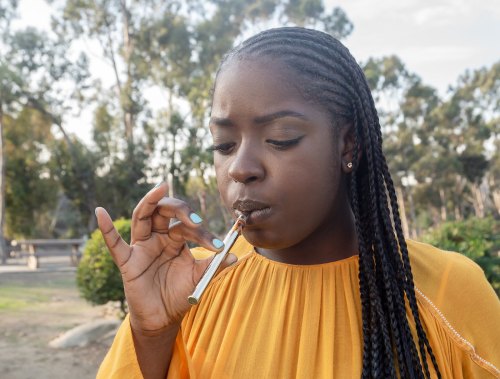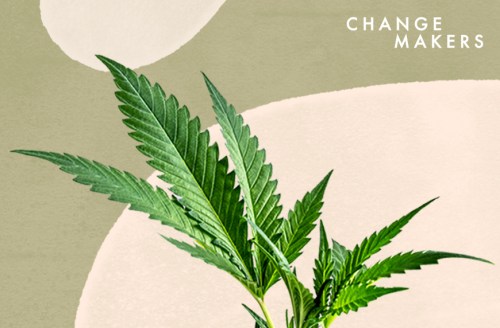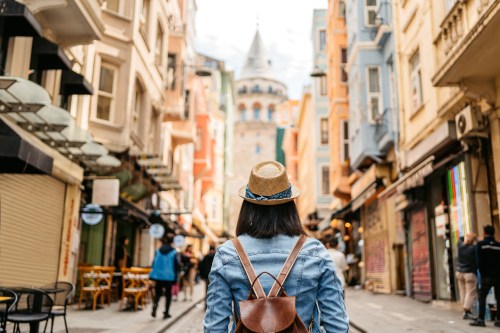On the surface, it looks as though the cannabis industry is wide open with opportunity right now. By 2025, the market for the medicinal plant is projected to be worth $66.3 billion, expanding at an annual growth rate of almost 30 percent. In five years time, experts say 625,000 people will be employed by hemp-related businesses, triple the current number. But look a little more closely, and you’ll see that those currently profiting from the marijuana boom are largely white men—a reality that prompted Charlese Antoinette Jones, Mary Pryor, and Tonya Rapley-Flash to launch Cannaclusive in 2017.
Their mission is big but simple—to give people of color a stake in the burgeoning cannabis world, both as business owners and consumers. “We originally came together out of frustration,” says Pryor, who was named one of Well+Good’s 2020 Changemakers along with Antoinette and Rapley-Flash. Most of the time, when they would attend cannabis industry events in Los Angeles, Pryor says she and her business partners were the only women of color in the room. “We were all interested in doing work in the industry and had a shared respect for the plant, but we were not being met with opportunities because of [racial] microaggressions.”
According to Pryor, there are many reasons why the cannabis scene isn’t as diverse as it could be—racism, sexism, murky government regulations, and lack of access to capital among them. Then there’s the fact that people of color are four times more likely to be arrested for marijuana possession as white people and, historically, those with felony cannabis convictions on their records have been barred from being involved with the industry. Most states and cities that have legalized the plant are taking steps to change this with social equity programs creating opportunities for those impacted by the war on drugs, but these vary by location and the results are mixed. In Ohio, which briefly implemented one such program focused on racial parity, 16.4 percent of medical marijuana businesses are owned by minorities, which is nearly twice the number of minority-owned businesses in the traditional economy. On the other hand, Massachusetts also has a social equity program, yet it doesn’t specifically focus on people of color. In that state, only 1.2 percent of recreational marijuana businesses are owned by minorities, in contrast to 11.5 percent of companies in the traditional economy.

Spurred by their desire to make the cannabis scene more diverse, the three founders brought together their eclectic skill sets—Pryor has a background in media, tech, and marketing, Rapley-Flash is a financial expert, and Jones is a wardrobe stylist and costume designer—to create Cannaclusive. Their first order of business was to help change perceptions around cannabis consumers in the media. “We noticed there wasn’t any destigmatized photography of people consuming the plant in public,” says Pryor. In response, the trio created a free stock photo library that shows a wide array of people partaking in cannabis—all far from the stoner stereotypes that are still perpetuated today.
They also began creating workshops and resources designed to help people of color break into the cannabis business, focusing on everything from strategy to PR and brand building. To help support existing businesses, they recently launched InclusiveBase in partnership with cannabis marketing agency Almost Consulting—a database that makes it easier for people to find and support minority-founded cannabis products and services.
Cannaclusive is also dedicated to educating consumers about the power of cannabis. “I’m really into helping people understand how to use cannabis as plant medicine,” says Pryor, who has been using it to manage Crohn’s disease symptoms for the past three years. “For people who don’t know anything about cannabis, [that knowledge] not really accessible.”
On top of these efforts, Cannaclusive also participates in social justice work to help support people in the transition from being jailed for cannabis to working in the space. “We work to be present for lobby days and events that are focused on providing guidance, and we even get invited to government roundtables about the situation at hand,” Pryor says. “There’s a big gap unless we fix the issue of decriminalization and try to get people formerly incarcerated involved. We’re doing everything we can to educate and advocate for people.”
Pryor knows that for Cannaclusive to reach its goals, there’s a long, hard road ahead. “As things are, we’re definitely on a path where things are going to look exactly the same or worse if we don’t start making needed awareness and change now,” she says. “We’re looking at a really major shift that’s going to have to come from a government that is not the most welcoming in terms of progressive change. The only thing that’s given me some hope is the fact that people are still fighting.” Given their passion for the cause, expect the founders of Cannaclusive to be on the front lines of that fight for a long time to come.
Could legal cannabis be the key to fighting the opioid crisis? Some experts think so. If you don’t live in a state where marijuana is legal, check out the 8 CBD skin-care products that an industry insider swears by—available all across the U.S.
Sign Up for Our Daily Newsletter
Get all the latest in wellness, trends, food, fitness, beauty, and more delivered right to your inbox.
Got it, you've been added to our email list.










